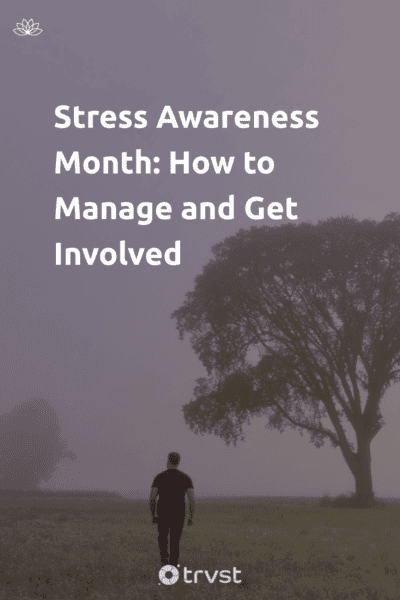Stress Awareness Month: How to Manage and Get Involved
In 1992, a non-profit organization started Stress Awareness Month, an event providing research about stress and dispelling its surrounding myths. Every April, it empowers people with the tools and knowledge to manage this often debilitating but totally normal human response.
The month-long observance encourages individuals to take action, motivating them to look at their lives and find ways to reduce stress. As you read the history, initiatives, and challenges of Stress Awareness Month, discover ways to have a stress-free lifestyle.
Featured in: April - Awareness Months, Days, & Observances
Stress Awareness Month History and Background

Stress Awareness Month, sponsored by the non-profit Health Resource Network (HRN), is a national initiative to educate people about the perils of stress, effective coping measures, and correct widespread misconceptions. As HRN's Founder and Director, Dr. Morton C. Orman, asserts. Over the past two decades, we've gained significant knowledge on stress. However, there's still more to uncover to alleviate the suffering of millions of people worldwide.
For this reason, Dr. Orman is calling upon leading healthcare establishments nationwide to generate and distribute valuable resources on stress throughout April. The month-long observation encourages stress experts and healthcare pioneers to organize public forums, discussions, and community events to further enlighten people about this prevalent issue.
Eventually, prominent organizations such as the American Psychological Association, National Institute of Mental Health, and International Stress Management Association supported the cause.
The Cause and Its Challenges
People often overlook chronic stress and its effects; stress occurs when the body responds to danger, which can be a helpful response. Specific stress hormones rush throughout your body in response to a risky situation. However, constant pressure can cause severe mental and physical health issues.
To let the numbers speak, American Psychological Association’s 2022 Stress in America survey revealed a steady average adult stress level of 5 since 2020 on a 1 to 10 scale. Alarmingly, stress impairs the daily functionality of more than a quarter of Americans2. Nearly two in five adults are unmotivated to do anything, while around a fifth experience forgetfulness and concentration issues.
Believe it or not, stress can even affect communities. Providing accessible mental health resources and stress education is critical, particularly for people who have not encountered these methods before.
5 Important Facts About the Cause

- According to Gallup’s 2023 Global Emotions Report, four in ten adults in 142 countries experienced stress3.
- Compared to acute stress, chronic stress is the most harmful. Unmanaged for a long time can lead to serious health problems. Multiple research has already connected stress to heart disease, high blood pressure, diabetes, and stomach disorders.
- Anyone can experience stress. It does not choose age, gender, and any other circumstances. However, its intensity and how one handles it may vary from person to person.
- A study reveals low to moderate stress levels lead to cognitive benefits that can foster resilience. Such stress levels also equip individuals to handle future adversities better1.
- We can reduce stress through various methods, such as meditating, exercising, and getting enough sleep. These are not mere options but rather necessities. However, the goal is not to eliminate stress but learn how to navigate it without getting overwhelmed.
Related: Aside from physical health activities, check out these mindfulness apps perfect for stress management.
Efforts and Initiatives
Spearheading global efforts, the World Health Organization (WHO) shares resources and strategies with governments and health organizations to address the situation. For example, at the height of the pandemic in 2020, they released Doing What Matters in Times of Stress: An Illustrated Guide. This free resource has exercises that everyone can benefit from.
The Stress Management Society in the UK has started a 30-Day Challenge every Stress Awareness Month. The initiative encourages people to do daily well-being activities. From calendars to workshops, they have plenty of personal stress management resources one can explore anytime.
Similarly, the Canadian Mental Health Association launched the 'Not Myself Today' campaign to promote mental health in the workplace. The campaign highlights why people need a supportive and collaborative work environment and why stress is more than “just a mental issue.”
Related: Since mental health is closely related to stress, learn more about World Mental Health Day or check out our Mental Health Quotes for words from those with lived experience.
How to Support Stress Awareness Month

For starters, we can discuss the effects of stress on physical and mental health with the people around us. Beforehand, take a stress test and encourage others to do it as well for better discussions.
Moreover, we can share facts and personal experiences with stress on social media. Our stories might help another person struggling with chronic stress. So talking to people online can ripple, bringing the condition out of the shadows and into the spotlight.
One can also volunteer for health organizations. Organizations are interested in extra help, knowledge sharing, and interconnectedness. By joining these groups, volunteers can understand themselves and have a space to support others and grow.
Fundraising can also raise awareness about stress. For example, fun runs or yoga classes can raise money, increase awareness, and give people tools to manage stress. If you want to start your own event, read our article about how to host a local community event.
Conclusion
National Stress Awareness Month allows us to acknowledge the reality of stress. By understanding the connection of physical and emotional health to stress, we can improve our overall well-being. Yes, after all our efforts to eliminate it, stress will still exist after April. So let's focus on things we can control and manage stress as much as possible. Let's bust it out and aim for a healthy and positive life!
| 1 |
Oshri, A., Cui, Z., Carvalho, C., & Liu, S. (2022). Is perceived stress linked to enhanced cognitive functioning and reduced risk for psychopathology? Testing the hormesis hypothesis. Psychiatry Research-neuroimaging, 314, 114644. |
| 2 |
American Psychological Association. (2022). Stress in America October 2022 Topline Data Stress in America™ Survey. |
| 3 |
Gallup, Inc. (2023, July 21). Global Emotions Report. Gallup.com. |
Mike is a degree-qualified researcher and writer passionate about increasing global awareness about climate change and encouraging people to act collectively in resolving these issues.
Fact Checked By:
Isabela Sedano, BEng.

